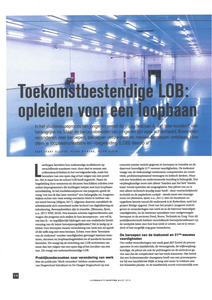Dat LOB anders moet lijkt evident, maar hoe kunnen we op een stimulerende manier jongeren helpen te navigeren in de richting die henzelf vooruit brengt en tegelijkertijd rekening houdt met de veranderingen in de arbeidsmarkt? Deze lastige vraag was de aanleiding om dit LOB-Kompas voor de 21e eeuw te schrijven. Dit LOB-Kompas is een eerste aanzet om leerlingen, docenten èn ouders op een andere manier te laten kennismaken met veranderingen in de beroepspraktijk. Het doel van deze LOB 2.0. methode is te worden ingezet als aanvullende module op de ‘traditionele’ LOB-methodes, zodat keuzebegeleiding toekomstbestendig wordt ingestoken en deze de leerling optimaal voorbereidt op een loopbaan die bij hem/haar past.
DOCUMENT

Op basis van de literatuur naar loopbaan coaching en keuzeprocessen (Germeijs & Verschueren, 2007; Slijper, 2017) is een aantal belangrijke stappen te onderscheiden in het keuzeproces van jongeren.
DOCUMENT

Leerlingen bereiden hun studiekeuze op verschillende manieren voor. Door open dagen en proeflessen en door allerlei LOB activiteiten die de school verzorgt. Bij de keuze voor een vervolgopleiding speelt het beroep ('wat kan/wil ik worden?') een belangrijke rol. Jongeren blijken echter vaak een verouderd én weinig overdacht beeld te hebben. Bovendien verandert het werk voortdurend en kan een beroep tegen de tijd dat een leerling de arbeidsmarkt betreedt er al weer anders uit zien. Om toekomstbestendige keuzes te kunnen maken is het belangrijk dat leerlingen worden voorbereid op een leven lang ontwikkelen. Verder speelt bij de keuze het exploreren een belangrijke rol. Daardoor is de leerling in staat te ervaren hoe bepaald werk is.
DOCUMENT

In het onderzoek staan vier vragen centraal: a. welke verschillende praktijken inzake loopbaanoriëntatie en -begeleiding (LOB-praktijken) zijn momenteel in het vmbo en in het mbo te onderscheiden? b. welke LOB-praktijken dragen bij aan het verwerven van welk soort loopbaancompetenties van leerlingen in het vmbo en in het mbo? c. wat is de relatie tussen loopbaancompetenties enerzijds, en de vorming van een arbeidsidentiteit, de leermotivatie, de uitvalsdreiging en de kwaliteit van de loopbaankeuzes anderzijds? d. welke good practices op het gebied van LOB, die in de bestaande onderwijsorganisatie een min of meer vaste plek hebben gekregen, zijn in het vmbo en mbo te ontdekken?
MULTIFILE

Reactie van Frans Meijers op het commentaar van Tom Luken op het artikel "Is loopbaanreflectie gevaarlijk?".
DOCUMENT

Rapportage van het onderzoek naar LOB-activiteiten onder studenten van vier participerende hogescholen.
DOCUMENT
In dit factsheet staan een aantal interventies om schoolverlaters en laatstejaars studenten met een grote kans op werkloosheid te ondersteunen bij het verbeteren van hun kansen op de arbeidsmarkt. Dit factsheet gaat vooral in op het verbeteren van de kansen van jongeren met een migratieachtergrond en een lage sociaal economische status. De beschreven interventies zijn evidence based en opgesteld op basis van twee onderzoeken1, gesprekken met experts en onderzoekers en ervaringen van het Expertisepunt LOB en het programma LOB en Gelijke Kansen. De uitkomsten van deze onderzoeken zijn in dit factsheet kort op een rij gezet zodat ze onderwijsinstellingen kunnen helpen bij hun subsidieaanvraag in het kader van de Subsidieregeling extra begeleiding en nazorg mbo 2021/2022.
DOCUMENT
